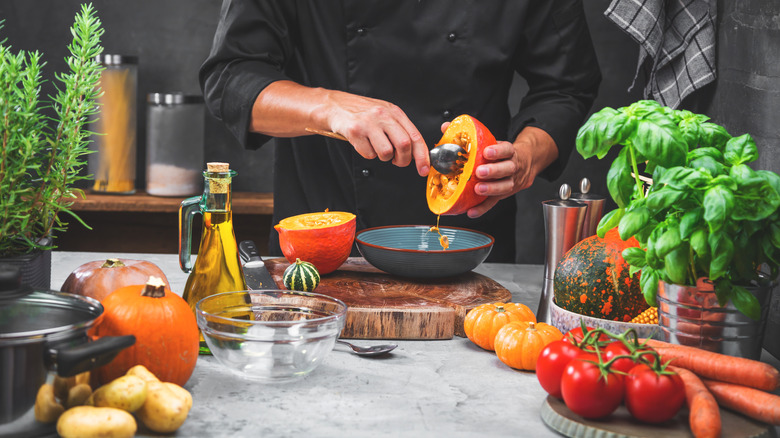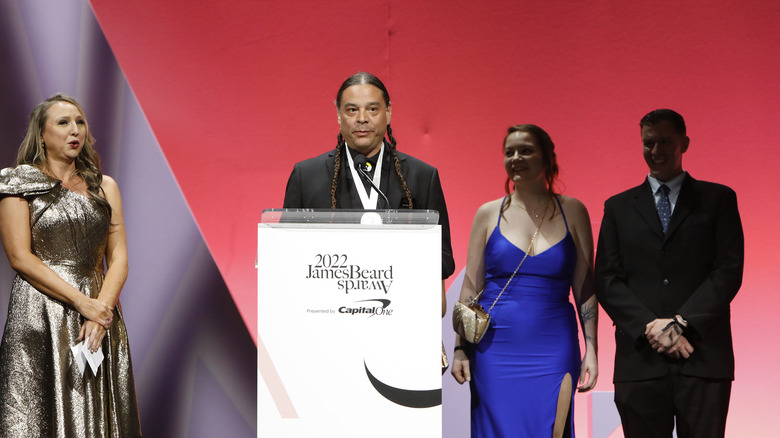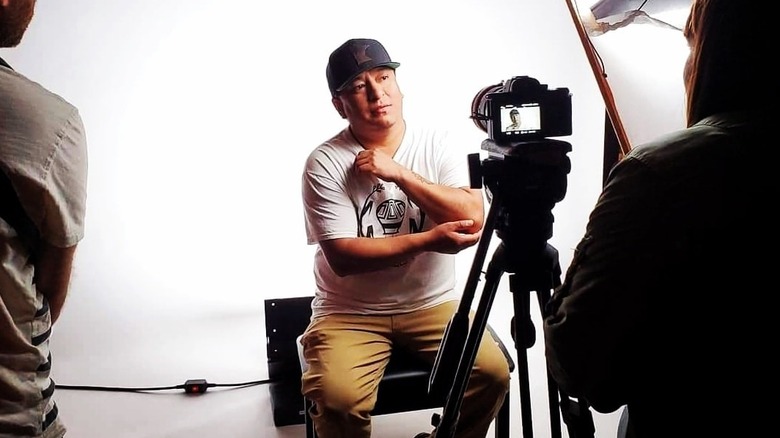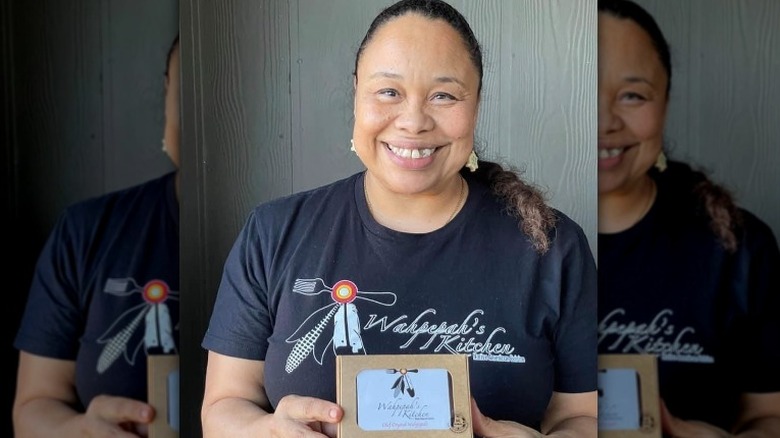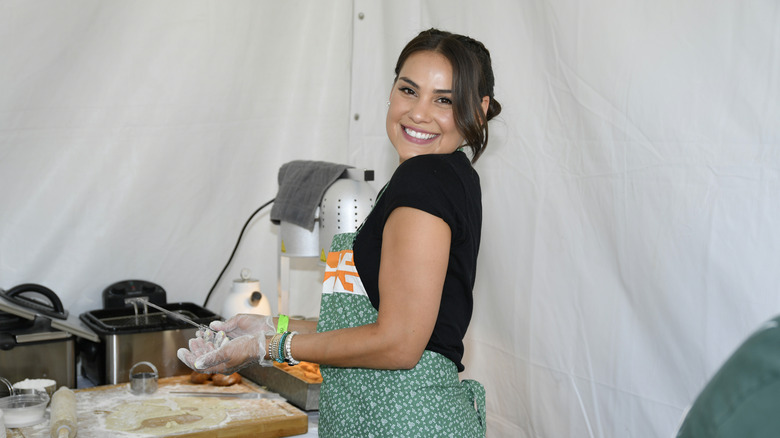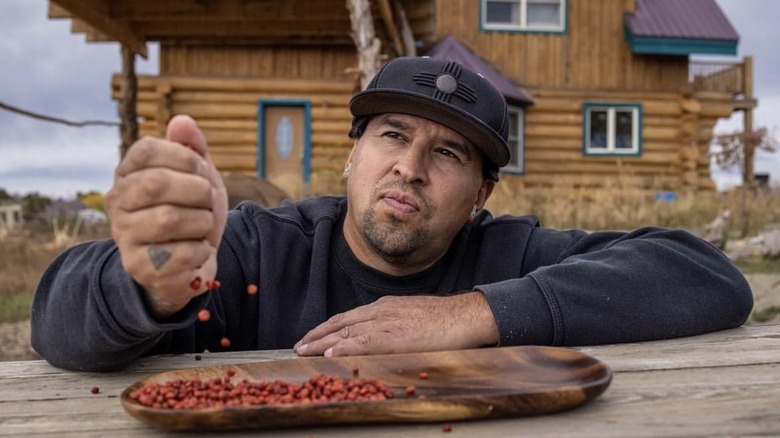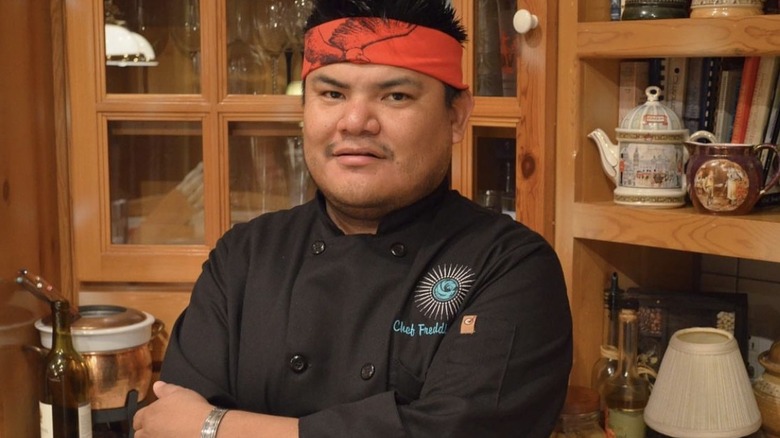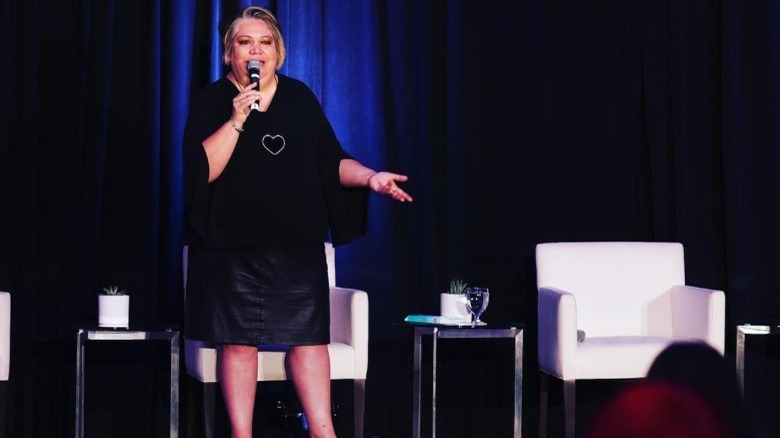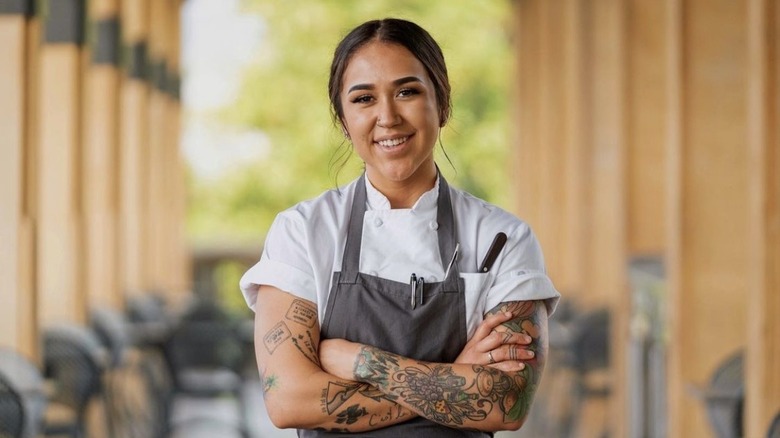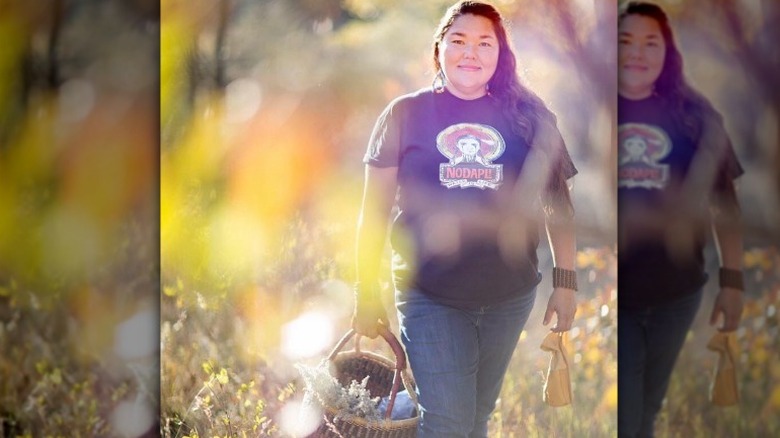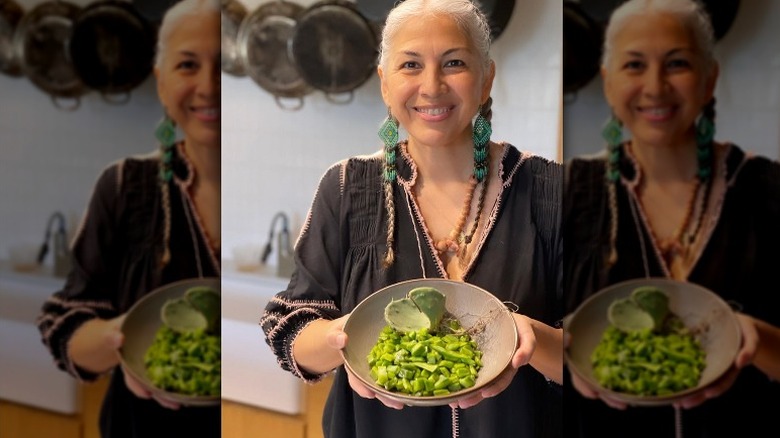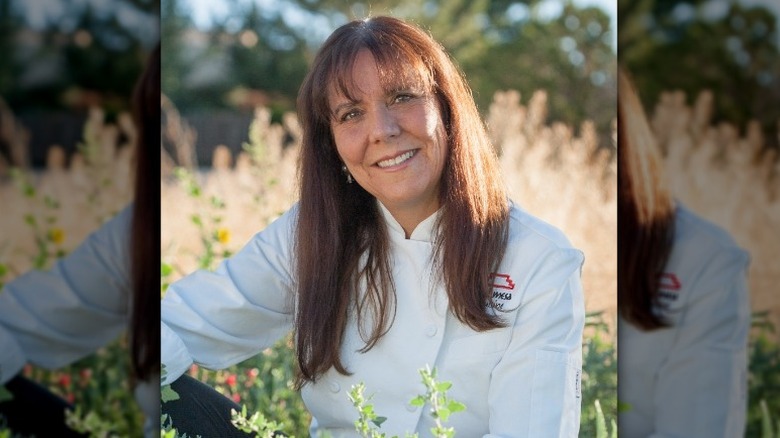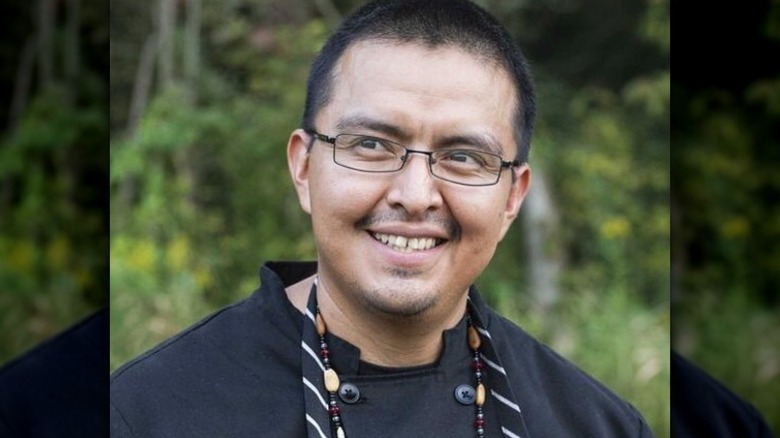12 Indigenous People In Food Who Are Changing The Culinary Landscape
Oftentimes when "American foods" are advertised in the media, plates of hamburgers, hotdogs, and chicken wings accompanied by piles of french fries or coleslaw are the standard. The original indigenous foods of the Americas are something quite different altogether. They are cultivated, foraged, and preserved for thousands of years yet are still significantly underrepresented in the commercial food industry. The Indigenous food sovereignty movement, supported by organizations like the Native American Food Sovereignty Alliance, celebrates, validates, and works to revive these nutritious, and sustainable practices and traditions — noting that they are not practices of the past but the present and of the future.
Understanding and growing these traditional foods and foodways, many of which were stripped or severed from Native American and Indigenous peoples by the U.S. government (via National Geographic), helps to heal and preserve the spiritual and communal health of many Native American communities.
"Native foods" are not just one thing. There are 547 federally recognized tribes in the U.S. alone. The varying climate, agriculture, and customs work to create nuanced dishes, ingredients, and cooking techniques within each community. The network of chefs, cooks, agriculturalists, ethnobotanists, and healthcare workers, stemming from these communities is wide and continues to grow, working to protect and improve the health of their communities and preserve the foodways. Here are just some of the many doing such work, changing the culinary landscape, and expanding how Indigenous foods are seen.
Sean Sherman - Lakota
Sean Sherman has become a well-recognized name within the Indigenous food sovereignty movement and the food industry. Having worked under the moniker The Sioux Chef since 2014, Sherman has been collecting awards and accolades ever since. In 2018 he added a James Beard award winner cookbook The Sioux Chef's Indigenous Kitchen alongside a more recent accolade of Best New Restaurant 2022, from the same organization for his first brick-and-mortar restaurant, Owamni. Owamni's staff, who overwhelmingly are Indigenous (via MPR news), is a restaurant that focuses on pre-European Native American ingredients, suppliers, and foodways. The restaurant's name comes from the Dakota name for where it sits in Minneapolis, translating to mean "The place of the swirling waters," notes The Chicago Tribune. The significance of its name runs deep — the name was archived and preserved by the grandfather of Sherman's longstanding business partner and co-owner Dana Thompson (Dakota).
Owamni is not only setting precedent for what is possible and what already exists within Native American cooking traditions, but it also helps to highlight Sherman and Thompson's non-profit arms of their business. NATIFS and Indigenous Food Lab, run under The Sioux Chef umbrella but as separate entities, work to educate, train, and support Indigenous chefs looking to make a career as an entrepreneur, cook, or otherwise within the food industry.
Brian Yazzie - Diné/Navajo
Chef and community organizer Brian Yazzie is no stranger to the overlap between Indigenous chef and Indigenous activist. He has been using the kitchen as his own form of resistance since his work at the Standing Rock demonstrations, organizing the kitchen to include Indigenous foods, which he supplied to help feed and fuel fellow activists in the fight to protect Sioux sacred burial grounds and water resources from the Dakota Access Pipeline.
During the onset of the pandemic, Yazzie was working as a traveling chef, caterer, and educator as co-owner of the business Intertribal Foodways, set up by Yazzie and his wife Danielle Yazzie-Polk. When his work suddenly dried up, Yazzie turned to his local community to see how best to use his skill set. He and other local volunteers set up the #feedingourelders community kitchen, which cooked and transported free meals to local Indigenous senior citizens, many of whom were vulnerable and had limited access to food and supplies. The movement gained momentum, eventually being picked up and supported by World Central Kitchen.
Yazzie now works as the executive chef at the Gatherings Café, notes The Circle, located at the Minneapolis American Indian Center.
Crystal Wahpepah - Kickapoo Nation
Crystal Wahpepah (Kickapoo Nation) has racked up many firsts in her culinary career. She was inducted into the Native American Almanac for being one of the first Native American women to own and run her own catering business, Wahpepah's Kitchen. She has been recognized as the first Native American chef to ever take part in the Food Network cooking show "Chopped" in 2016. She told The Oaklandside, "It was more than just a TV show about me, it's about paving the way for other Indigenous chefs. Letting people know: We are still here, and we're still cooking."
Born and raised in Oakland, California, and home to Wahpepah's Kitchen, Wahpepah has the hats of chef, entrepreneur, and activist, having received an Indigenous Activist Award for her work. Having grown up in an urban community with people from a variety of Indigenous backgrounds, Wahpepah works to showcase the variety of Indigenous foods within her own catering business, working to debunk the myth that Native food is a monolith.
Driven, passionate, knowledgeable, and with a seemingly endless well of creativity, Wahpepah's food business ventures now include a catering arm, a full menu restaurant, and nutritional bars. She was recently nominated for the James Beard Emerging Chef Award 2022. Using a wide variety of Indigenous ingredients grown and produced from Indigenous suppliers, Wahpepah told The Guardian, "The most beautiful thing about being a Native American chef is the community and who you get to work with."
Pyet DeSpain - Prairie Band Potawatomi Nation
Pyet DeSpain was crowned winner of the first season of Next Level Chef, a high-pressure cooking contest run by Gordon Ramsay, Nyesha Arrington, and Richard Blais. Pyet, a shortened name from her Native American name Pyetwetmokwe, grew up in Kansas, with part of her childhood spent on the Osage Indian Reservation. She later relocated to Los Angeles (via Pyet's Plate).
DeSpain told Mashed, "I'm a woman in the culinary world. I'm also a Native American, also Mexican American, I think it's phenomenal and I'm super honored and proud to represent indigenous food. It's not only that I am native, but I'm also making native food on the show and I'm trying to bring my heritage in and it's a phenomenal experience."
Though Indigenous and Native foods and their history are moving more into the public eye and public acknowledgment, (via QRS magazine), it is still the anomaly, rather than the norm, especially within reality television cooking competitions.
DeSpain uses her culinary training and wellness and nutrition certification in her work as an LA-based private chef, with a focus on health and Indigenous ingredients at the heart of her work. She also works to incorporate her "Indigenous Fusion " point of view, which uses both her Native American and Mexican roots. In 2021, she was named as one of the top ten private chefs in Los Angeles by Entrepreneur Magazine.
M. Karlos Baca – Tewa, Diné, Nuchu
Karlos Baca has been at the forefront of the Indigenous food sovereignty movement and its connection to wild foods for many years.
Baca is an avid and knowledgeable forger, seed saver, activist, and educator. He is the founder of the organization Taste of Native Cuisine and co-founder of the I-Collective, who describe themselves as an "autonomous group of Indigenous chefs, activists, herbalists, seed, and knowledge keepers." The I-Collective works to create innovation and conversations around food sovereignty and Indigenous community health. They are also in the process of putting together a cookbook for which Baca is the lead writer. It's currently being released as multi-media issues under the title "A Gathering Basket."
Baca is also the founder of 4th World Farms, which focuses on pre-Colonial Native foods and re-indigenizing the local ecology.
Though one would think Baca's seemingly endless energy would mean he moved quick and spoke even quicker, his manner feels unhurried and intentional, as is evident by his conversation on The Splendid Table to discuss the wild Indigenous plants, medicines, and how they are easily overlooked or wasted. Baca is thoughtful and measured, much like one would imagine he must be when he's out in nature, moving in line with the pace of the plants he knows so much about.
Freddie Bitsoie – Diné/Navajo
Freddie J. Bitsoie was not always aware his anthropology degree would lead him into the kitchen. Growing up in the Southwest and within the presence of Native American communities and traditions, he became interested in topics around culture, identity, and history. After his degree, Bitsoie went on to train in classic French cuisine before bringing his understanding of Indigenous foods, from a studied and a lived experience together with his culinary training.
In 2013, while working as executive chef at the Navajo Nation's Fire Rock Casino in New Mexico, Bitsoie won the Living Earth Festival Native Chef Cooking Competition, held annually as part of the Living Earth Festivals, by the Smithsonian Museum in Washington D.C. In 2016, Bitsoie stepped into his new role as Executive Chef at the Mitsitam Café, located inside the Smithsonian National Museum of the American Indian. He tells the Independent, "Thinking about what Native American cuisine is; that's so many different cultures!"
Bitsoie held the role until the start of the pandemic when museums in D.C. shut down. During this time, he wrote his first book, "New Native Kitchen: Celebrating Modern Recipes of the American Indian" published in 2021. He tells New Mexico Magazine, "It's new Native American food. The world has changed; our palates evolve. But this is what Native Americans contributed to the world. I want that to resonate."
Inez Cook – Nuxalk Nation
Inez Cook is the chef-proprietor and co-founder of the Vancouver-based restaurant Salmon n' Bannock. Cook is also the author of a children's book "Sixties Scoop" referring to the commonplace action of Indigenous Canadian children being "scooped" by the Canadian government, placed into foster care, and re-homed in non-Indigenous families (via CBC Vancouver). Cook writes this book based on her personal experience, having only reconnected to her Nuxalk Nation background in adulthood.
Given Cook's personal journey into understanding her roots, her restaurant celebrates what it means to be Indigenous, employing staff from a variety of First Nation and Indigenous communities. Bannock, like fry bread, can generate a mixture of feelings. The well-known food in Canada is entwined with Scottish settlers and colonialism. Bannock is also served at traditional First Nations feasts and celebrations, similar to the prevalence of fry bread in similar Native American gatherings in the U.S. The bannock on the menu at Salmon n' Bannock is baked rather than fried.
Cook's menu also includes indigenous ingredients like salmon, game, maple syrup, dried bison, and wild rice, known as manoomin, from the Ojibwe land around the Great Lakes. She told Atlas Obscura, "I think [going for indigenous cuisine] should be as obvious as 'Let's go for sushi.' It should be part of the regular dialogue."
Siobhan Detkavich – Cowichan
Siobhan Detkavich made her television debut as both the youngest chef and the first Indigenous chef to take part in the popular cooking competition Top Chef Canada in its most recent ninth season. Given the 600+ First Nation communities federally recognized in Canada, this was a long time coming.
Though Detkavich is still in the earlier stages of exploring her Cowichan culinary roots and their influence, she is proud of her heritage and the platform she's had to showcase the beauty of Indigenous cultures and communities within the public eye (via APTN News). She told Abeego, "With the incredible opportunity to take part in season nine of Top Chef Canada, it gave me a platform to bring awareness to cooking for reconciliation and sovereignty... to inspire the Indigenous youth to strive to achieve whatever they put their mind to if they work hard for their goals."
Detkavich is now hosting her very first T.V. series called "Dine Your Sign" which began airing in September (via gusto tv).
Linda Black Elk – Catawba Nation
Linda Black Elk is an Indigenous ethnobotanist, knowledgeable forager, activist, and teacher. She shares her knowledge widely and freely on her Instagram account, including videos of Indigenous edible plants, foods, and medicines that she finds in parking lots, urban areas, and other unexpected places wherever she travels. One of Black Elk's strengths lies in not only providing a variety of options and suggestions for how to spot these plant medicine, but numerous ways in which they can be used (via Rob Greenfield).
Black Elk is also the Food Sovereignty coordinator at the United Tribes Technical College in North Dakota. She teaches classes like "Food Preservation and Storage" and "From Farm and Forage to Fork." She also uses her wealth of knowledge and charismatic ways of connecting through her YouTube channel, covering topics like making homemade cedar blueberry cough syrup, drying squash varieties, and how to make plant-based medicines at home for various health support.
Black Elk's drive to make wild plants and plant medicine accessible, applicable, and relevant is so strong it resonates throughout all she does. She is also a founding board member of the Mni Wichoni Health Circle, an organization devoted to decolonized medicines.
Felicia Cocotzin Ruiz - Xicana & Tewa
Felicia Cocotzin Ruiz is a type of traditional healer called a curandera. She is also a trained natural foods chef, and the author of her first book "Earth Medicines," which was recently named the winner of the "Eating the West" category of the Reading the West book awards.
Cocotzin Ruiz was recently featured alongside above chef Brian Yazzie, in an episode titled "The Original Americans" as part of Padma Lakshmi's award-winning series "Taste the Nation."
Cocotzin Ruiz teaches a lot about the notion of "self-care" and what that can look like from an Indigenous Native American and Indigenous Mexican perspective. In a series called "Nourished Mama," she and her sister Andrea, a midwife, work together by providing resources and support, helping people during and through postpartum recovery. This offering also includes foods based on ancestral traditions.
Cocotzin Ruiz is passionate about changing the often-whitewashed culture around health and wellness, by expanding it to include Indigenous plants and plant medicine.
Lois Ellen Frank - Kiowa Nation
Lois Ellen Frank has spent the last 30 years in Santa Fe, New Mexico, working to document and preserve the food and foodways of Native American communities in the Southwest. She is a James Beard Award winner for the book that she both wrote and photographed, "Foods of the Southwest Indian Nations" in 2003.
Frank applies her training in culinary anthropology directly to her work with Indigenous foods and community health. She has been collecting awards and responsibilities alongside her quest for knowledge, serving as a Culinary Ambassador Diplomat in her travels to Ukraine, the U.K., and Russia to teach and share her understanding of Native American foodways and agriculture and their incredible impact on the rest of the U.S. and the world (via Red Mesa Cuisine.)
Frank is also a chef teacher for the Santa Fe School of Cooking alongside running her own catering business Red Mesa Cuisine with Diné (or Navajo) chef Walter Whitewater. They specialize in Indigenous cuisine and cultural education. Frank grew up in what she described to "Plant Yourself Podcast" as a "multi-ethnic, multi-faith background" participating in traditions from her mother's background in the Kiowa Nation and her father's Ashkenazic and Sephardic roots.
Nephi Craig - White Mountain Apache & Diné
Nephi Craig is the founder of the Native American Culinary Association as well as the founder and executive chef of Café Gozhóó, located inside the Rainbow Treatment Center. Craig also serves as Nutritional Recovery Program Coordinator on the White Mountain Apache reservation. The ties between delocalization, health, and recovery are inherently linked.
During some of the hardest parts of the pandemic, many chefs were digging into their creative resources and the power of technology to connect to audiences. Craig was no exception, using his extensive culinary training and knowledge of Indigenous ingredients in what he called "Wu-Tang Wednesdays." Craig would play music and demonstrate a wide range of dishes from refined creations to comfort foods. His joy and honesty resonated with his audience each of the 36 weeks he did this.
Recently, at an annual conference for Native American Nutrition, Craig opened his speech by saying, "The best thing I can do is be open and transparent about my journey because that's the most powerful tool I have. The same is true for you." He went on to discuss themes around colonial violence, mental health struggles, addiction, and recovery. His vulnerability and humor combined with extensive knowledge are radical.
Craig has cooked Native foods, not only in his own community but across the world — in London, Germany, Japan, and Brazil (via Rouxbe.com). He continues to speak powerfully and honestly about health, recovery, and decolonization within the kitchen and the classroom.
